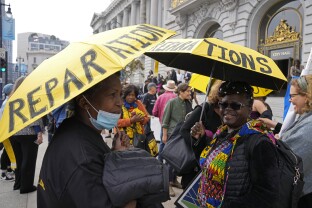Prominent leaders in the Black community want President Joe Biden to make a major push for reparations — and to do it soon, before the crucial November elections.
They think it’s time for Biden to speak out more publicly about the need to pass reparations bills, even if it’s tough to do with a Republican-controlled House.
“Even if they can’t make something happen legislatively, one of our main real demands is to push the president to use the bully pulpit to create at least a media cycle around reparative justice,” said Marcus Hunter, executive director of United by Equity, one of the groups pushing for reparations measures.
Lawmakers and organizations sent two letters to Biden in February calling for meetings on how to best move reparations measures forward. One came from Democratic Reps. Barbara Lee, Sheila Jackson Lee, Cori Bush and Jamaal Bowman; the other was signed by over 150 organizations and individuals, including Rev. Al Sharpton, NAACP President Derrick Johnson, the National Black Justice Coalition and organizers United by Equity.
But so far, Lee said no meeting has been scheduled.
“We know the president is committed to equity. I see it as a key pillar of the administration,” Lee said. “But, we have several bills we’ve been trying to get through the door. The first step will be to actually get the meeting I’ve requested.”
The White House did not respond to a request for comment.
In 2021, Biden supported parts of a bill introduced in the House by Jackson Lee that would have established a commission to study reparations, saying he thought a study was the “best next step.”
A Pew Research Center poll from the following year suggested that while 77% of Black Americans support reparations for the descendants of enslaved people, only 18% of white Americans support it. Biden is currently lagging with Black voters, and some believe that pushing for reparations could help.
“There are things that [Biden] has done that people can feel, like his student loan debt cancellations and monies from the American Rescue Plan,” Bush said. “But, the community is saying there are things specific to racial equity and civil rights that we want to see the president uplift that would absolutely motivate voters.”
There are more than 10 pieces of legislation addressing different aspects of racial inequity circulating Congress currently. Hunter, who helped Lee craft legislation to create a commission on truth and racial healing, said the independent efforts were beginning to work against the community.
“I started to realize that we are all being siloed from each other,” Hunter said. “Every time we would try to push the White House or the Domestic Policy Council, their first refrain would be to ask how one reparations effort related to others. The insinuation in the question is that we don’t work together.”
Advocates are attempting to show a more unified approach.
“All those efforts intersect around racial equity and racial justice; they just address it from different perspectives because there are a lot of layers to how you unpack a system of institutional racism,” Lee said.
Advocates said that the president and vice president should acknowledge the cities and states that have taken up their own versions of reparations. Right now, local officials are not sure of the administration’s level of interest in the effort, Hunter said.
“A lot of them are worried that what they’re doing does not matter because they’re not hearing it federally or getting a news cycle and fear there will be no momentum to keep it going,” Hunter said.
Sign up for the latest from NOTUS.
Supporters of reparations also believe Biden could take executive action to push through policies that address inequality.
“I would love for the White House to be leading the conversation, taking executive action on reparations for African Americans,” Bowman said.
Activists with Unity by Equity are planning a public show of unity to happen around Juneteenth. The Equity March will start at the Lincoln Memorial and end at Black Lives Matter Plaza.
“We’re doing it steps away from the White House as a way to say this is the thing you gave us,” Hunter said, referring to the president signing the law establishing Juneteenth as a federal holiday. “We’re using it to show that we still care about these issues and want to hold you accountable for them.”
—
Calen Razor is a NOTUS reporter and an Allbritton Journalism Institute fellow.
Sign in
Log into your free account with your email. Don’t have one?
Check your email for a one-time code.
We sent a 4-digit code to . Enter the pin to confirm your account.
New code will be available in 1:00
Let’s try this again.
We encountered an error with the passcode sent to . Please reenter your email.


